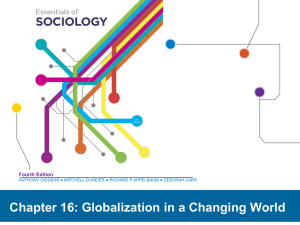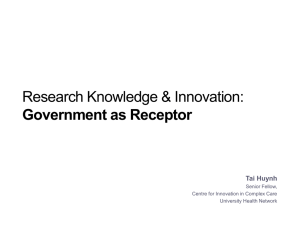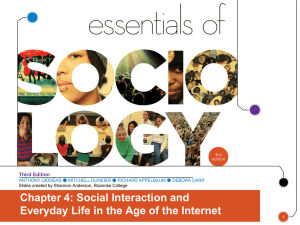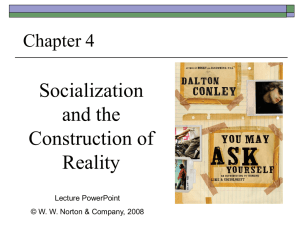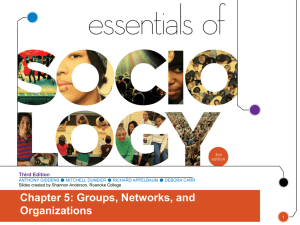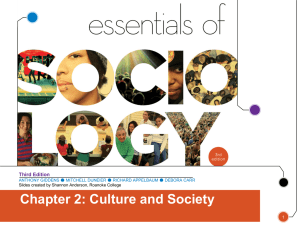Chapter16
advertisement
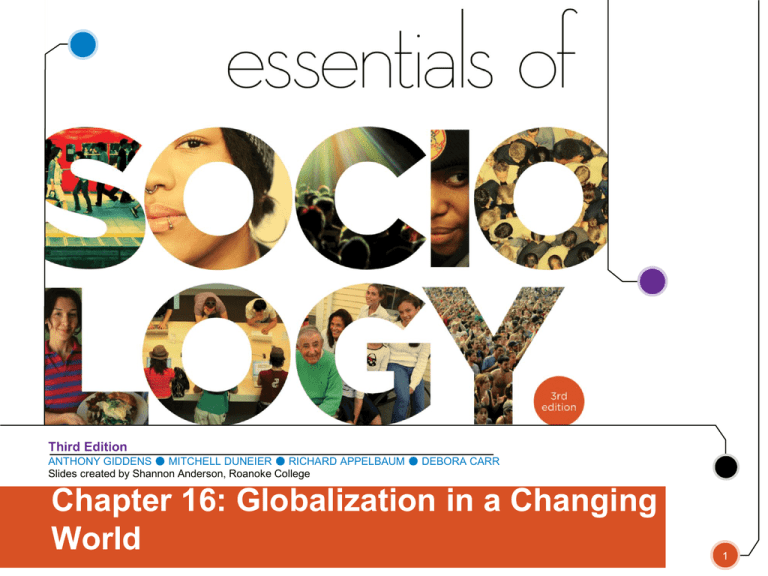
Third Edition ANTHONY GIDDENS ● MITCHELL DUNEIER ● RICHARD APPELBAUM ● DEBORA CARR Slides created by Shannon Anderson, Roanoke College Chapter 16: Globalization in a Changing World 1 The big issues • Defining globalization • Connecting globalization to modernity and major social change • Examining social movements: what they are and how they are global • Exploring what social forces lead to increased globalization © 2011 W. W. Norton Co., Inc. 2 Globalization and social change • Globalization is the process through which the world is increasingly connected and interdependent. – At level of individuals, groups, organizations, states, and so on – This process is largely associated with economic and political change. • In the modern period, globalization has accelerated rapidly. © 2011 W. W. Norton Co., Inc. 3 Linking globalization and social change • • • • • Responding to environmental factors Emergence of the political state New communication technologies Religious pluralism and the need for tolerance Expansion of industrial capitalism © 2011 W. W. Norton Co., Inc. 4 What follows modern society? • Postindustrial society: Knowledge and service become the primary products. • Postmodernity: A rupture with core understandings of history and belief—no central narratives, only diversity © 2011 W. W. Norton Co., Inc. 5 The “Geek Squad,” a company founded by Robert Stephens in Minneapolis, Minnesota, and later purchased by the Best Buy retail chain, provides consumer computer support and technical repairs. Essentials Of Sociology, 3rd Edition Copyright © 2011 W.W. Norton & Company Social movements and social change • Collective action is a factor in social change. • Many movements today—including the antiglobalization movement—are global in scope. • We now have new social movements, which are less goal oriented and more identity oriented. © 2011 W. W. Norton Co., Inc. 7 Approaches to social movements • • • • Economic deprivation Resource mobilization Structural strain Fields of action © 2011 W. W. Norton Co., Inc. 8 Modern technology and social movements • Use of Internet for organization and fundraising • Speeds up the process with instant information and response. • Allows for fast coordination of events like rallies, protests, and so on. • Could indicate a shift in power © 2011 W. W. Norton Co., Inc. 9 Table 16.1 Global Unevenness of Telecommunications Infrastructure and Use Essentials Of Sociology, 3rd Edition Copyright © 2011 W.W. Norton & Company What makes globalization? • Economic factors – Transnational corporations – Integrated financial markets • Global flow of information and communication © 2011 W. W. Norton Co., Inc. 11 What makes globalization? • Political changes – Fall of communist regimes – Rise of IGOs and INGOs – Rising importance of international coalitions (the European Union, United Nations, etc.) © 2011 W. W. Norton Co., Inc. 12 Globalization in everyday life 1. IKEA furniture 2. Wii games 3. H&M fashions 4. L’Oreal shampoos or beauty products 5. Samsung cell phone or PDA 6. Molson beer 7. Birkenstock sandals 8. Diesel jeans 9. Apple iPhone 10. American Express credit card © 2011 W. W. Norton Co., Inc. ______________ ______________ ______________ ______________ ______________ ______________ ______________ ______________ ______________ ______________ 13 Globalization in everyday life 1. IKEA: founded in Sweden, now owned by a Dutch foundation 2. Wii: MNC in Kyoto, Japan 3. H&M: Swedish company 4. L’Oreal: Paris suburb 5. Samsung cell or PDA: Seoul, South Korea 6. Molson beer: Montreal, Canada © 2011 W. W. Norton Co., Inc. 14 Globalization in everyday life 7. Birkenstocks: Germany 8. Diesel jeans: Molvena, Italy 9. Apple iPhone: established in California, parts from China 10. American Express: New York City © 2011 W. W. Norton Co., Inc. 15 The globalization debate • There are three main positions: – Skeptics – Hyperglobalizers – Transformationalists © 2011 W. W. Norton Co., Inc. 16 Table 16.2 Conceptualizing Globalization: Three Tendencies Essentials Of Sociology, 3rd Edition Copyright © 2011 W.W. Norton & Company How we feel about globalization • Increasing need to construct our identities • Significant shifts in work and family life • Ubiquity of Western—especially American— popular culture © 2011 W. W. Norton Co., Inc. 18 Risk in a global world • Manufactured risk versus external risk • Potentially devastating consequences – – – – – Urbanization and industrialization Pollution Global warming Nuclear power Bioengineered food © 2011 W. W. Norton Co., Inc. 19 Global inequality • Wealth concentrated in the developed world – Poorest 40 percent of global population—5 percent of global income – Richest 10 percent—54 percent of global income • Global markets have exacerbated this problem: The gap between rich and poor is growing. © 2011 W. W. Norton Co., Inc. 20 The Widening Gap Between Richer and Poor Countries, 1800 – 2008 GOP PER CAPITA* 1800 2008 USA $1,343 $42,922 GERMANY $1,643 $32,637 JAPAN $896 $31,824 REPUBLIC OF KOREA $740 $23,845 BRAZIL $509 $9,633 SOUTH AFRICA $759 $9,630 EGYPT $748 $5,678 CHINA $992 $5,520 PAKISTAN $665 $2,671 2008 1980 1950 DEM. REP. OF CONGO $394 1900 $370 * 2008 U.S. $ Essentials Of Sociology, 3rd Edition Copyright © 2011 W.W. Norton & Company Note: GDP for South Africa from 1911; 1900 data not available © 2011 W. W. Norton Co., Inc. 1800 SOURCE: Gapminder.com 2009 21 The Widening Gap Between Richer and Poor Countries, 1800 – 2008 MEDIAN GOP PER CAPITA* $40K $20K $0K 1850 Low Income Countries 1900 Medium Income Countries Essentials Of Sociology, 3rd Edition Copyright © 2011 W.W. Norton & Company © 2011 W. W. Norton Co., Inc. 1950 2000 High Income Countries SOURCE: Gapminder.com 2009 22 Does free trade help? • Many INGOs believe free trade will reduce global inequality • Critics argue that a global justice movement that pushes for trade organized around protecting rights and resources is needed. © 2011 W. W. Norton Co., Inc. 23 This concludes the Lecture PowerPoint Presentation for Chapter 16: Globalization in a Changing World For more learning resources, please visit our online StudySpace at: http://www.wwnorton.com/college/soc/essentials-of-sociology16/ W. W. Norton & Company Independent and Employee-Owned © 2011 W. W. Norton Co., Inc. 24 Clicker Questions 1. What is social change? a. the transformation over time of revolution b. the transformation over time of the institutions and culture of society c. the transformation over time of social movements d. the transformation over time of collective behavior © 2011 W. W. Norton Co., Inc. 25 Clicker Questions 2. One of the main influences on social change consists of cultural factors. Which one of the following is considered a cultural factor in social change? a. type of political organization b. religion c. environmental conditions d. industrial capitalism © 2011 W. W. Norton Co., Inc. 26 Clicker Questions 3. What factor helps to explain the rise of new social movements over the past few decades? a. Traditional political institutions are increasingly ignoring a whole set of new threats, ranging from environmental crises to genetically modified organisms, because they are unable to cope with the challenges of trying to find solutions to them. b. People today feel less isolated than in the past and are more willing to join movements. c. Because these new movements are so focused on the economics and politics of globalization, people from around the world are drawn to them. d. People today feel more entitled and bold when it comes to challenging the government. © 2011 W. W. Norton Co., Inc. 27 Clicker Questions 4. Joaquin believes that the world economy has become less integrated and interdependent than it was in the past. He believes that the driving forces of globalization are governments and markets and that internationalization depends on government acquiescence and support. Also, he believes the pattern of stratification has been increased marginalization of the global South. Based on this information, we would classify Joaquin’s beliefs as belonging to which school of thought? a. skeptics b. transformationalists c. hyperglobalizers d. individualists © 2011 W. W. Norton Co., Inc. 28 Clicker Questions 5. Globalization is proceeding in an uneven way and some of the consequences of globalization are far from benign. Next to mounting ecological problems, which of the following is one of the most serious challenges facing the world at the start of the twenty-first century? a. the expansion of inequalities within and between societies b. the expansion of inequalities between competing high-income countries c. the expansion of inequalities between overpopulated and under-populated countries d. the expansion of inequalities between oil-rich countries © 2011 W. W. Norton Co., Inc. 29 Art Presentation Slides Chapter 16 Globalization in a Changing World Anthony Giddens Mitchell Duneier Richard P. Appelbaum Deborah Carr Chapter Opener Essentials Of Sociology, 3rd Edition Copyright © 2011 W.W. Norton & Company Rwandan refugees trying to reach the United Nations camp in Tanzania. Essentials Of Sociology, 3rd Edition Copyright © 2011 W.W. Norton & Company The “Geek Squad,” a company founded by Robert Stephens in Minneapolis, Minnesota, and later purchased by the Best Buy retail chain, provides consumer computer support and technical repairs. Essentials Of Sociology, 3rd Edition Copyright © 2011 W.W. Norton & Company Relative deprivation between the peasantry and the elite in France led to the overthrow of the monarchy in the late 18th century. Essentials Of Sociology, 3rd Edition Copyright © 2011 W.W. Norton & Company Table 16.1 Global Unevenness of Telecommunications Infrastructure and Use Essentials Of Sociology, 3rd Edition Copyright © 2011 W.W. Norton & Company A call center in Gurgaon, India. Essentials Of Sociology, 3rd Edition Copyright © 2011 W.W. Norton & Company Do-It-Yourself Essentials Of Sociology, 3rd Edition Copyright © 2011 W.W. Norton & Company Transnational corporations such as Coca-Cola are eager to tap growing markets in countries like China and India. Essentials Of Sociology, 3rd Edition Copyright © 2011 W.W. Norton & Company Table 16.2 Conceptualizing Globalization: Three Tendencies Essentials Of Sociology, 3rd Edition Copyright © 2011 W.W. Norton & Company A Chinese woman buys a ticket to see Titanic at a Beijing theater. Essentials Of Sociology, 3rd Edition Copyright © 2011 W.W. Norton & Company A dairy farmer uses rBST (bovine growth hormone) to increase his herd’s milk production. Essentials Of Sociology, 3rd Edition Copyright © 2011 W.W. Norton & Company Globalization and Everyday Life Essentials Of Sociology, 3rd Edition Copyright © 2011 W.W. Norton & Company Globalization and Everyday Life Essentials Of Sociology, 3rd Edition Copyright © 2011 W.W. Norton & Company The Widening Gap Between Richer and Poor Countries, 1800 – 2008 GOP PER CAPITA* 1800 2008 USA $1,343 $42,922 GERMANY $1,643 $32,637 JAPAN $896 $31,824 REPUBLIC OF KOREA $740 $23,845 BRAZIL $509 $9,633 SOUTH AFRICA $759 $9,630 EGYPT $748 $5,678 CHINA $992 $5,520 PAKISTAN $665 $2,671 2008 1980 1950 DEM. REP. OF CONGO $394 1900 $370 * 2008 U.S. $ Essentials Of Sociology, 3rd Edition Copyright © 2011 W.W. Norton & Company Note: GDP for South Africa from 1911; 1900 data not available © 2011 W. W. Norton Co., Inc. 1800 SOURCE: Gapminder.com 2009 44 The Widening Gap Between Richer and Poor Countries, 1800 – 2008 MEDIAN GOP PER CAPITA* $40K $20K $0K 1850 Low Income Countries 1900 Medium Income Countries Essentials Of Sociology, 3rd Edition Copyright © 2011 W.W. Norton & Company © 2011 W. W. Norton Co., Inc. 1950 2000 High Income Countries SOURCE: Gapminder.com 2009 45 W. W. Norton & Company Independent and Employee-Owned This concludes the Art Presentation Slides Slide Set for Chapter 16 Essentials Of Sociology THIRD EDITION by Anthony Giddens Mitchell Duneier Richard P. Appelbaum Deborah Carr


